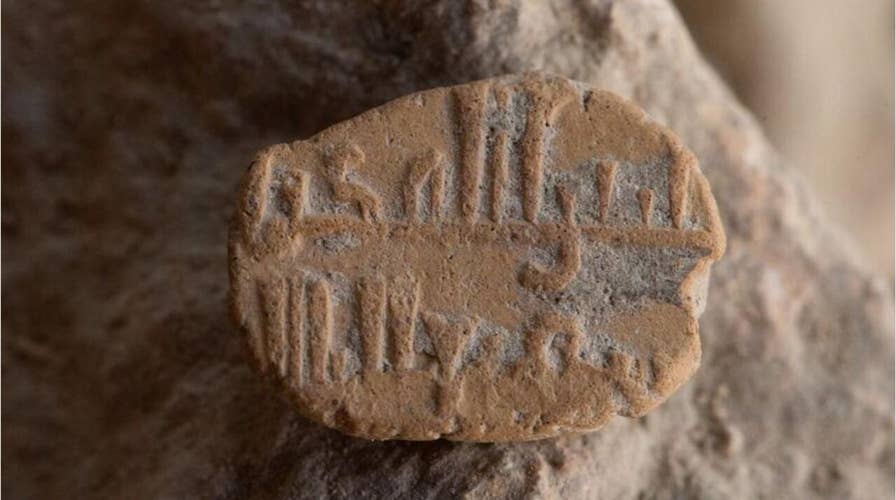Rare clay amulet discovered in the City of David
Rare clay amulet with a personal blessing discovered in the City of David.
Archaeologists in Israel have unearthed an extremely rare ancient clay amulet with a blessing in Arabic.
The clay artifact, which dates back to the 9th or 10th century, was uncovered during the excavation of a parking lot at the City of David archaeological site.
The tiny amulet, which is only 1 centimeter in size, features a two-line inscription in Arabic, which is either a blessing or a personal prayer. “Kareem trusts in Allah,” and “Lord of the Worlds is Allah,” it reads.
DEAD SEA SCROLLS DISCOVERY: TECH REVEALS HIDDEN SCRIPT
“The size of the object, its shape, and the text on it indicate that it was apparently used as an amulet for blessing and protection,” explained excavation directors Prof. Yuval Gadot of Tel Aviv University and Dr. Yiftah Shalev of the Israel Antiquities Authority, in a statement.
Discovered sealed between plaster flooring during the excavation of a small room, the amulet offers a fascinating glimpse into life in Jerusalem during the early Islamic period. However, experts are unsure whether it was deliberately buried under the floor or simply lost by a man named Kareem.
“Because this amulet does not have a hole to thread it on a string, we can assume that it was set in a piece of jewelry or placed in some sort of container.”
KING DAVID'S CITY DISCOVERED? ANCIENT SITE LINKED TO BIBLICAL KINGDOM, ARCHAEOLOGISTS SAY
While shards of pottery and a lamp discovered near the amulet date back around 1,000 years, archaeologists are still uncertain what the site was used for. “The poor preservation of the architecture make the purpose of the structure difficult to determine,” they said, in a statement. “It is interesting to note that several installations indicate cooking activities that occurred here. Modest structures from the same period were found in prior excavations at the same site, including residential homes interspersed with stores and workshops. It is reasonable to assume that this structure was used as part of that same industrial zone.”
Israel continues to reveal its archaeological secrets. In a separate project experts uncovered an ancient burial complex in Northern Israel that dates back around 2,000 years.
The rock-hewn burial cave was recently discovered during construction work in the city of Tiberias. Ancient robbers likely plundered the cave, according to archaeologists.
HOW JESUS DIED: ANCIENT CRUCIFIXION VICTIM OFFERS NEW CLUES
The cave, which dates back to the Roman period, was blocked up in order to protect it, and it will studied by experts from the Israel Antiquities Authority.
There have been a number of fascinating finds in the region in recent years. Archaeologists in Israel, for example, have uncovered a site that may offer fresh insight into the ancient biblical kingdom of David and Solomon. In another project a trove of bronze coins, the last remnants of an ancient Jewish revolt against the Roman Empire, were recently discovered near the Temple Mount in Jerusalem.
In February, archaeologists announced the discovery of a clay seal mark that may bear the signature of the biblical Prophet Isaiah.
MYSTERIOUS POOL AND FOUNTAIN DISCOVERED AT ANCIENT CHRISTIAN SITE IN ISRAEL
Last November, new evidence dated Christ’s tomb in Jerusalem’s Church of the Holy Sepulchre to the Roman era, matching historical records.
Other finds include the skeleton of a pregnant woman, dating back 3,200 years, in Israel’s Timna Valley, at a place once called King Solomon’s Mines.
At the site of an ancient city on the West Bank, archaeologists are also hunting for evidence of the tabernacle that once housed the Ark of the Covenant.
Some experts also believe they have found the lost Roman city of Julias, formerly the village of Bethsaida, which was the home of Jesus' apostles Peter, Andrew and Philip.
Follow James Rogers on Twitter @jamesjrogers









































